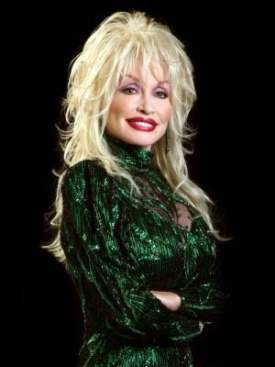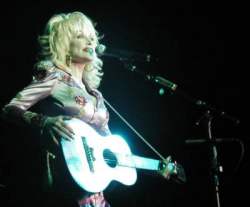DAVE'S DIARY - 11 NOVEMBER 2003 -DOLLY PARTON
DOLLY
DUELS WITH GOD - AND MAYBE STEVE EARLE
"This old world has gone to pieces/ can we fix it, is there time?/
hate and violence just increase/ we're so selfish, cruel and blind/ we
fight and kill each other/ in your name, defending you/ do you love some
more than others?/ we're so lost and confused." - Hello God - Dolly
Parton.
It's unlikely Dolly Parton and Steve Earle will be two stepping together
at a bluegrass wedding.
 |
Dolly
has proven she's a little smarter than peers who resurrect their
careers with new images to fit the fads of the day. |
It's like
he's everybody's God but we want to pigeon hole him as just belonging
to us. Well, I know that ain't right. It can't be. It's just us being
stupid and foolish because God is everybody's."
The song, companion song of sorts to Alan Jackson's 'Where Were You
When The World Stopped Turning,?' is further proof country music has
long been the literate music of the people.
Other songs gifted to her include 'Color Me America,' which she
performs live, and 'Raven Dove' - a 2 am visitation spawned from
the lines "raven of darkness, dove of peace."
She wrote most of the songs in spontaneous sessions at her East Tennessee
mountain home and cut them with local pickers and road band at a nearby
Knoxville studio.
Ironically, the title track and album theme was inspired by a pilot of
a TV show she unsuccessfully pitched to Fox and not a fairly recent George
Jones single.
"It sets up the whole album being about sinners and saints,"
Dolly says in her liner notes, "I go from one song about swimming
naked in the pond to a spiritual number. We're all struggling to be good,
but we can't be all the time."
Parton has long been a melancholic mistress of mood swings - 'Sugar
Hill' is not just a paean to her record label but an embryonic love
locale.
And, of course, one liners - "my own little record label is called
Blue Eye so I thought this would be a great blue eye way to brown nose."
| The
singer owes much of her longevity to song hoarding - she found 'Not
For Me' on a tape of songs she wrote in 1964 when she first hit
Music City. That era also produced the gospel tinged 'John Daniel' - which pre-dates 'Jolene': it enabled her to use her Dollywood theme park 'Kingdom Heirs' quartet. Much more modern is 'If Only' borrowed from the music for her Mae West movie. |
 |
Unlike bluegrass
banished to self parody by pious practitioners the Parton progenitor peaks
in 'These Old Bones' where Dolly mimics mama.
And she lands a few punches or, is that scratches, on tabloid tremors
- a bitter sweet career caricature for her and peers diverse as Loretta,
Tammy, Tanya Tucker, Carlene Carter, Rosanne Cash and Lorrie Morgan.
Dolly examines ruptured romance from her assertive rack off Romeo on 'I'm
Gone' to the fragility of suffering in 'Dagger Through The Heart.'
And all of this cut to measure in a sugar hill coated cloak of bluegrass
and gospel with harmonies from Beth and April Stevens.
Now, back to Earle whose marriages outnumber Dolly's six to one and lost
the Del McCoury band as touring compadres because of on stage profanities.
Well, Steve moves back into the rock jungle with new disc 'Jerusalem'
and lanced the radio boil by writing 'John Walker's Blues' from
the viewpoint of the Taliban recruit.
It features Earle's recitation of an Arabic prayer and ends with mullahs
reading from the Quran.
DOLLY EXPOSES HER BLUEGRASS TIPS
Big Rock Candy Mountain belle Dolly Parton met her match when she traded
make up and hair care hints with Boy George on release of her bluegrass
album, The Grass Is Blue, in 1999.
The big haired hombres teamed on dance duet, Your Kisses Are Charity,
before Dolly returned to the roots of her Smoky Mountains raising in East
Tennessee.
"He outdid me on the make-up," Dolly said of the London gig,
"he came out and his hair was bigger than mine. He had a big rhinestone
necklace and big ear-rings. I got jealous because he out-dressed me. I
wish I would have known because I has some gaudier stuff as well. I loved
his make up. I love the way he does his eyes and he loves the way I do
mine."
Milking a miss-match of the most mirthful kind is one of the many strong
suits for a singer who soared to fame with rhinestone retro prince Porter
Wagoner in the sixties.
Since then Dolly's dynamics have propelled a multi-media career in movies,
music, writing and TV show hosting.
But behind the glitz and glamour beats a hurting heart that heralded the
peak of her career on The Grass Is Blue and second bluegrass album
Little Sparrow (Sugar Hill-Shock).
Dolly exposed her humanity by launching an Eagle Mountain Sanctuary to
protect America's bald eagles at her famed Dollywood theme park at Pigeon
Forge in Sevier County, Tennessee.
It was followed by her Dollywood Foundation - an educational support body
reducing the high drop out rate in the mountain areas of her childhood.
So, with more than 3,000 original tunes in her catalogue and close to
80 albums in a recording career that began in 1966, it was a win-win situation
to cut what bluegrass fans wanted.
That was spawned by a trip three years ago to a Smoky Mountains cabin
where she holed up and fasted for two weeks and wrote 37 songs - embryo
for her roots country comeback album Hungry Again.
So what took Dolly, who often cut bluegrass songs, so long to return to
her roots explored in My Tennessee Mountain Home and Heart Songs At Dollywood
with Suzanne Cox and Allison Krauss?
"If you're on a major label, like I was for so long, it really not
the kind of stuff that makes any money," Dolly revealed, "you
can't make a living doing gospel music or bluegrass music, as a rule.
It's unfortunate because it's a great music. I guess I had to wait till
I was rich enough to sing like I was poor again."
Dolly, wed to Carl Dean since 1966, debuted on the charts with Dumb Blonde
in 1967 and has spent the past 34 years proving she wasn't.
The commercial radio dork talk dudes don't get it but those of us raised
on rural rooted country music are riding in the driver's seat since Dolly
revived such classics as the Louvin Bros' Cash On The Barrelhead,
Lester Flatt's I'm Gonna Sleep With One Eye Open, Johnny Cash's
I Still Miss Someone and four of her own tunes including the title
track on The Grass Is Blue.
And, now two years down the lost highway, Dolly returns with help from
friends Claire Lynch, Alison Krauss, Rhonda & Darrin Vincent, Sonya
Isaacs, Rebecca Lynn Howard, Chris Thiele, Jerry Douglas, Maura O'Connell,
Carl Jackson and Dan Tyminski.
Little Sparrow finds her spreading a lavish layer of fertile phosphate
on a bridge between the Appalachian and Anglo-Celtic ballad traditions.
This time she revives the oft recorded Steve Young tune Seven Bridges
Road and The Beautiful Lie penned by the late Amazing Rhythm
Aces co-founder-drummer Butch McDade - also from East Tennessee - and
Cole Porter's I Get A Kick Out Of You.
But she peaks in six originals - My Blue Tears, Blue Pastures, Mountain
Angel, Marry Me, Down From Dover and the title track.
In Mountain Angel the singer's heroine is destroyed by a "wicked
handsome stranger" - the devil in disguise.
Sonya Isaacs and sister Becky Isaacs Bowman harmonise on Celtic laced
Down From Dover - a tawdry tale of an illegitimate child that dies.
"Back when I first recorded it in the sixties you couldn't talk about
a girl being pregnant out of wedlock on the radio, especially a girl with
a dead baby," Dolly says, "you weren't to talk of a pregnant
girl being run out of home. Porter Wagoner even had me take a verse out."
The singer is joined by Irish group Altan for a verse in Gaelic in revamped
gospel standard In The Sweet By And By.
Parton is qualified to sing about her roots - she vividly recalls her
Smoky Mountains childhood.
"We'd just set up there on those old porches," Dolly says, "It's
not like we had any place to go. There were no trains, no cars, no buses.
So you were really up there with the woods and the people. That world
was really embedded in me, and it still is. I'm one of those artists that
still writes about it, still sings about it, still loves it. It's my Smoky
Mountains DA, deep in every fibre of my body."
Dolly is the beacon for younger, lesser known proteges - long submerged
in a sales swamp that fast becomes quicksand when they chance their arm
on the more creative country sub genres.